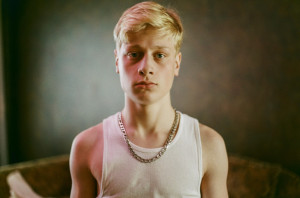On my second last day in Cannes I decided to skip the 8:30 a.m. press screening, in favor of sleep. Exhaustion is an occupational hazard at Cannes when trying to cram in three movies a day, meals, sleep and writing coverage. The film I was missing was “The Search,” the latest by Michel Hazanavicius, best known for his overly praised silent film, “The Artist.” I was dreading seeing it anyway, as Chuck Williamson (@ch_williamson), on Twitter summed it up: “A two-and-a-half hour film set in war-torn Chechnya directed by Michel Hazanavicius = my personal hell.” It received almost exclusively bad reviews.

If you’re willing to wait to see a film until the day after all of the press frenzy and buzz, you can see it at a more reasonable time, with a shorter line-up and priority access. At most screenings, there’s a rank order of press passes, and if you’ve got the lowest priority badge, like this journalist, you can line up for two hours and not even get in. But at La Salle du Soixantième, where day-after screenings are held, I showed up at about 11:15 a.m. for a 12 p.m. screening and was maybe 50th in the press line, which gets let in first. By that time, there were already hundreds of people in line with industry badges, referred to as “Marché de Film,” who only get access to the screenings after all the press are seated.
I was there to see the new film by two-time Palme d’Or winners Jean-Pierre and Luc Dardenne, “Deux Jours, Une Nuit,” starring Marion Cotillard. The day before, people were praising it as a masterpiece, predicting a long-overdue Cannes Best Actress award for Cotillard, and a third Palme for the Belgian brothers. But one of the things I’ve learned here on the Croisette this week is that reviews at the festival tend to be hyperbolic: critics denounce mediocre films as utter trash and call merely good films ‘masterpieces.’
Because there are relatively few films screened, about 60 overall compared to the 300 at the Toronto International Film Festival, and everyone sees them on the same day, there’s enormous pressure to get your review out there quickly before it’s no longer buzzworthy. This rush to publish, often less than two hours after a film finishes, means the opinions written aren’t particularly considered: critics denounced Atom Egoyan’s flawed but well-directed “Captives” as beyond terrible, and within a few days, other outlets had further propagated this exaggeration. Despite being a fan of the Dardennes, I walked into the screening with a healthy dose of skepticism.
“Deux Jours, Une Nuit” is a very good film by the Howard Hawks definition— “Three great scenes, no bad scenes”— but it wasn’t as emotionally stirring as I suspect it was trying to be. It was the story of Sandra (Marion Cotillard), a married woman and mother-of-two recovering from depression, who finds out her boss has just polled her co-workers to decide if she gets to keep her job a vote: they can either vote to fire her or to give up their 1000 Euros bonus. They vote for the bonus, 14-2, but it wasn’t an anonymous vote and one of their supervisors was deliberately scaring people into voting against Sandra.
When she manages to get her boss to agree to a re-vote on Monday, she has the weekend to visit each of her coworkers at home to try to persuade them to vote her way. Sandra is convinced it’s a fool’s errand: her self-confidence is still at a low, and she understands the other employees need the money from their bonus. Since her family depends on the income from her salary, she reluctantly sets out.
I’ve never seen Marion Cotillard be anything short of great, and this is no exception. The Dardennes favour long, uncut takes, which lets us watch Cotillard convincingly go through multiple emotions within the space of minutes, a real feat. They also shoot her walking towards each of her coworker’s homes, and there’s a subtle shift in her posture and gait as she gains confidence. She starts off slouched and shaky, but fiercely determined. As more people agree to vote her way, she wavers less and less. When making her requests, there’s the perfect balance of trepidation and strength, fear and determination. If she were to win the Best Actress award, it would be richly deserved.
After the train wreck that was Jean-Luc Godard’s 2010 “Film Socialisme,” a perplexing film intentionally without subtitles meant to alienate the non-French-speaking audience (I speak French and I still had no clue what it was about), I decided to skip his new 3D film, “Goodbye to Language.” Instead, I headed over to one of the festival’s sidebars, the Directors’ Fortnight, to see the latest from Studio Ghibli, “The Tale of Princess Kaguya,” directed by Isao Takahata. It’s a gorgeously drawn film, where the landscapes look like watercolor paintings, and the characters are beautifully etched in charcoal.
The film is about a bamboo cutter who finds a doll-sized person who looks like a Princess in a bamboo stalk. Within seconds, she transforms into a human baby who screams and cries, and before long, she is doing bare-bottomed somersaults. The young girl gets the nickname “Little Bamboo” from the local kids because she grows up unusually quickly: within weeks, she’s a full-grown woman.
Before long, her adopted father decides to move them all to a mansion in the city, where she can get an upbringing befitting of a princess-to-be. She’s a reluctant student, preferring the freedom she had in her youth, and there’s a somewhat interesting narrative about how gross it is that she’s being trained to become some man’s property. The middle stretch drags quite a bit— at over two hours, the film could lose about a quarter and not miss muchbut this is a buoyant tale with humor and visual wit, without the promise of a Disney happy ending.

After a quick dinner at the bizarre American-owned burger place across the street from the Palais— half the employees only speak English, and the other half only speak French— and some macarons from Ladurée, I returned to the Palais for the press screening of Xavier Dolan’s “Mommy.” At just 25, this is the fifth film from the French-Canadian director, and its his fourth to screen Cannes. It is, however, the first time he’s had a slot in the Official Competition: he took his last film to Venice out of spite for not getting into the Competition the last time he was here. Since the film is Québecois, where they speak their own dialect of French with anglicized slang, a “joual” accent, and swear words like “tabernac,” otherwise unknown in the French-speaking world, Dolan wrote French subtitles, which screened with the film.
“Mommy” was warmly applauded at Wednesday’s press screening, which has quickly turned it into a front-runner for the Palme d’Or. It’s certainly one of the best films I’ve seen in Competition. Dolan has a singular vision, and he’s crafted a funny, emotional, personal, and provocative film. Shot it in the unusual 1:1 aspect ratio, like Instagram, the characters are necessarily very close to one another when in close-ups, or they wouldn’t all fit into the frame. If a character is looking at something, the camera has to move to show us what.
As the story of the too-close relationship between a mother, Die (Anne Dorval) and her troubled son, Steve (Antoine-Olivier Pilon), who feel like society is out to get them, the 1:1 aspect ratio makes the film feel appropriately claustrophobic. Gorgeously and expertly shot by cinematographer André Turpin, you quickly forget that the aspect ratio reminds you of something you could shoot on your phone: there’s nothing amateurish here. There seems to be hope when their neighbor Kyla (Suzanne Clément) comes into their orbit, a former teacher with a newly developed stutter, who helps Steve get on track, and brings warmth into their relationship. But Steve has a short fuse, and we’re told at the beginning of the film that it’s the future, and Canada has implemented a new law that allows parents to send their children to a mental institution, no questions asked, if they become too much to handle. The law is a ticking time bomb.
As Steve, the blond-haired Pilon is charismatic and goofy at times, and rash and violent at others. Even when he’s at his most lovable, there’s the suggestion of something darker that lies beneath. Clément makes Kyla a quiet and compassionate woman, easily seduced by Die’s fast-talking and Steve’s childish doting. Together, they help Kyla come out of her shell, and rediscover the joie de vivre. Dorval steals the show as the fiesty Die, whose potty mouth and love of a good time mask the fact that she’s ill-equipped to deal with her son’s problems and may be a source of them. Much of what she says is hilarious, which makes the otherwise dark film, easier to swallow.
Contact Alexandra Heeney at arts “at” stanforddaily.com.
